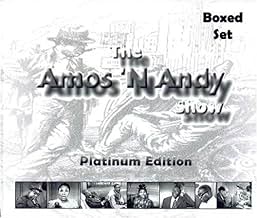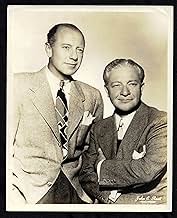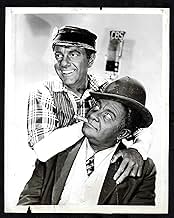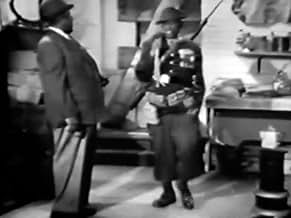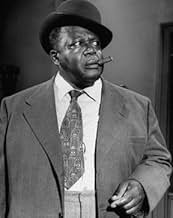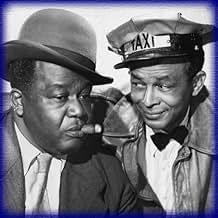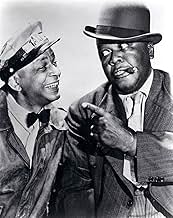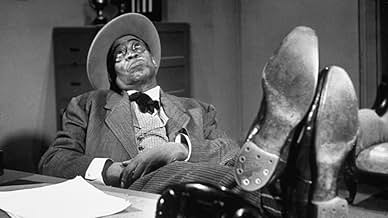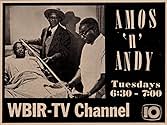Stories mostly centered on The Kingfish's schemes to get rich, often by duping his brothers in the Mystic Knights of the Sea Lodge. Andy was particularly dupable. Amos mostly narrated.Stories mostly centered on The Kingfish's schemes to get rich, often by duping his brothers in the Mystic Knights of the Sea Lodge. Andy was particularly dupable. Amos mostly narrated.Stories mostly centered on The Kingfish's schemes to get rich, often by duping his brothers in the Mystic Knights of the Sea Lodge. Andy was particularly dupable. Amos mostly narrated.
- Nominated for 1 Primetime Emmy
- 1 nomination total
Browse episodes
Featured reviews
Seeing the amos N andy show in reruns when i was 5 in the late 50's in new york, i remembered some of the funniest shows I had ever seen. Having recently obtained the 73 shows known to be in existence, I am still laughing uproariously. It is a shame more people have not been exposed to these fine actors and the hilarious sketches they perform. It is also distinguished by the first show in TV history to have blacks perform in white collar occupations such as judges, lawyers, business owners and the like. if the Kingfisher isn't one of the most talented comedians in early TV, i don't know who is. The rubbery face and big sad eyes made him perfect for this part. The kingfisher was not the main performer in the radio program, but became so in the TV series. He is really the first actor to become prominant in a TV program where he was not intended to be when the stories were originally written. much the same as fonzi became the star at Happy Days. if you do not see these most funny shows, you are missing some of the early and funniest history of TV.
I've just watched a documentary on African-Americans on television which showed several clips from "Amos and Andy". It got me thinking about this show that I watched when it was syndicated in our area 40 years ago. For the record I am a middle-class white male, but I don't think it really matters that much. I haven't seen an entire episode in decades but my memories of the show seem to be similar to others so I will trust them. I too, agree that the show has something of a bad rap but I think the reasons why are interesting.
I agree with the several posters who have compared this to "The Honeymooners", which was obviously influenced by it. You have the men out front, not as smart as they think they are, hatching various schemes to make their dreams come true or cover up their missteps while smarter females lecture them for their foolishness when the smoke clears. Things like the lodge they belong to are obvious parallels. If the Honeymooners could be a classic, why couldn't Amos and Andy? The characters are not servants or shoe-shine boys. It's whole black community. I remember noticing that all the characters were black when I was a kid but just regarded it as a peculiarity. If the show taught me anything about blacks is that they are just like everyone else. Is that harmful? I agree that the fact that the series gave black performers jobs is not an "excuse" for racial stereotyping. But just search the IMDb for a look at the actor's careers after this show ended. Spencer Williams's career basically ended. Alvin Childress showed up on Perry Mason as a janitor. Tim Moore was blacklisted, (an ironic term). There's something to be said for employment.
So why is this show linked with Stepin Fetchit or "Rochester" as an example of black stereotyping such that it's been essentially banned from TV for four decades through the efforts of the NAACP, (ironic that Moore was banned by rightists and his show by leftists)? Firstly, while it does present an entire black community, it does use traditional elements of black humor- exaggerated dialects, references to lazy or untrustworthy characters, etc. However the same elements are present in later "black" shows such as "Good Times", which were not banned.
Perhaps a stronger reason was that the show was created and performed on radio by two white men, Freeman Gosden and Charles Correll, who had appeared on film playing the characters in blackface. That further links the show to racist stereotyping and illustrates that its genesis was certainly in the white man's view of comical black men. However subsequent documentaries have indicated that Gosden and Correll were anything but racists themselves and were respected by their TV counterparts who went on to make the characters their own in a series that was much toned down from the radio show.
I think perhaps the biggest problem with Amos and Andy is that it was the only show that attempted to depict black life in America in the 1950's. Whites had Joe Friday and Paladin and Dr. Kildare, so when they watched Ralph and Ed they didn't look at them as representatives of the white race. They just looked at them as a couple of funny guys. Blacks had no Joe Friday or Paladin or Dr. Kildare so these comic characters became their symbol. When it came time to move on, they were left behind.
I agree with the several posters who have compared this to "The Honeymooners", which was obviously influenced by it. You have the men out front, not as smart as they think they are, hatching various schemes to make their dreams come true or cover up their missteps while smarter females lecture them for their foolishness when the smoke clears. Things like the lodge they belong to are obvious parallels. If the Honeymooners could be a classic, why couldn't Amos and Andy? The characters are not servants or shoe-shine boys. It's whole black community. I remember noticing that all the characters were black when I was a kid but just regarded it as a peculiarity. If the show taught me anything about blacks is that they are just like everyone else. Is that harmful? I agree that the fact that the series gave black performers jobs is not an "excuse" for racial stereotyping. But just search the IMDb for a look at the actor's careers after this show ended. Spencer Williams's career basically ended. Alvin Childress showed up on Perry Mason as a janitor. Tim Moore was blacklisted, (an ironic term). There's something to be said for employment.
So why is this show linked with Stepin Fetchit or "Rochester" as an example of black stereotyping such that it's been essentially banned from TV for four decades through the efforts of the NAACP, (ironic that Moore was banned by rightists and his show by leftists)? Firstly, while it does present an entire black community, it does use traditional elements of black humor- exaggerated dialects, references to lazy or untrustworthy characters, etc. However the same elements are present in later "black" shows such as "Good Times", which were not banned.
Perhaps a stronger reason was that the show was created and performed on radio by two white men, Freeman Gosden and Charles Correll, who had appeared on film playing the characters in blackface. That further links the show to racist stereotyping and illustrates that its genesis was certainly in the white man's view of comical black men. However subsequent documentaries have indicated that Gosden and Correll were anything but racists themselves and were respected by their TV counterparts who went on to make the characters their own in a series that was much toned down from the radio show.
I think perhaps the biggest problem with Amos and Andy is that it was the only show that attempted to depict black life in America in the 1950's. Whites had Joe Friday and Paladin and Dr. Kildare, so when they watched Ralph and Ed they didn't look at them as representatives of the white race. They just looked at them as a couple of funny guys. Blacks had no Joe Friday or Paladin or Dr. Kildare so these comic characters became their symbol. When it came time to move on, they were left behind.
They could not have put together a better or more talented group of people. Amos and Andy, and a lot of other shows from back then need to be on television now. Those would be reruns even I would sit down to watch. As far as it depicting ignorance, or the people being uneducated, just about all the shows were made on the same level from that time period. There was true comedy on T.V. back then. Look what happened in later years on television. Mr. Ed was smarter than Wilbur ever hoped to be, but, it made a good show.
When this show was attacked for being politically incorrect, I had a visceral reaction of anger, as I used to love it when I was a kid. The actors were so warm to the audience, watching the show was almost like having a personal relationship with them. As a true friend, I have to resent the harsh accusation that "Amos 'n Andy" created dangerous racial stereotypes.
The characters from the show are no more racial stereotypes than any of the other popular characters of low comedy on TV, such as Lou Costello, Baciagalupe, Ralph Cramden, Stan Laurel, Private Doberman, Uncle Tonoose, Gomer Pyle, and a host of others. Maybe the problem is that "politically correct" critics object to low comedy of any kind. Or perhaps they are irrationally blaming the makers of "Amos 'n Andy" for the fact that black actors have never gotten enough serious roles from Hollywood.
Hostile music critics have voiced similar complaints that much of blues and folk music is politically incorrect, that it demeans a race of people by creating "primitive stereotypes." In both cases, I find the criticisms offensive because vaudeville style comedy and blues singing are arguably among the greatest contributions America has made to world culture.
The critics of "Amos n' Andy" would do better to take a shot at recently made crime movies set in the ghettos of today, which contain some of the most evil and offensive racial stereotypes ever put on screen. "Amos n' Andy" never intended to offend!
The characters from the show are no more racial stereotypes than any of the other popular characters of low comedy on TV, such as Lou Costello, Baciagalupe, Ralph Cramden, Stan Laurel, Private Doberman, Uncle Tonoose, Gomer Pyle, and a host of others. Maybe the problem is that "politically correct" critics object to low comedy of any kind. Or perhaps they are irrationally blaming the makers of "Amos 'n Andy" for the fact that black actors have never gotten enough serious roles from Hollywood.
Hostile music critics have voiced similar complaints that much of blues and folk music is politically incorrect, that it demeans a race of people by creating "primitive stereotypes." In both cases, I find the criticisms offensive because vaudeville style comedy and blues singing are arguably among the greatest contributions America has made to world culture.
The critics of "Amos n' Andy" would do better to take a shot at recently made crime movies set in the ghettos of today, which contain some of the most evil and offensive racial stereotypes ever put on screen. "Amos n' Andy" never intended to offend!
I have 78 episodes on DVD. The characters are incredibly Funny. I'm a white man & feel like most others. The show is comedy not a documentary. The humor is harmless. I don't think that the honeymooners depict a negative image of white folks. Compare the 2 shows, the constant scheming, the outfits, the lodge, etc... Most average folks in those days were real poor & related to the humor. I don't know about you, It's a shame some people are that defensive That they can't laugh at show anymore & put it in perspective with the times it was created. It should still be available on T.V. Like the other classics.I love it.
Did you know
- TriviaIn the documentary Amos 'n' Andy: Anatomy of a Controversy (1983), Alvin Childress (Amos) said that he never felt that the show was that negative of a portrayal of blacks since it was the only television show at the time that showed black people as businessmen, policemen, judges and doctors rather than maids or janitors.
- Quotes
George 'Kingfish' Stevens: [accepting an award from his lodge brothers] Thank you, brothers; and, in the words of that great American poet Ralph Walnut Emerson, you all has my infernal gratitude.
- ConnectionsFeatured in Television Land (1971)
- How many seasons does The Amos 'n Andy Show have?Powered by Alexa
Details
- Runtime
- 30m
- Color
- Aspect ratio
- 4:3
Contribute to this page
Suggest an edit or add missing content

